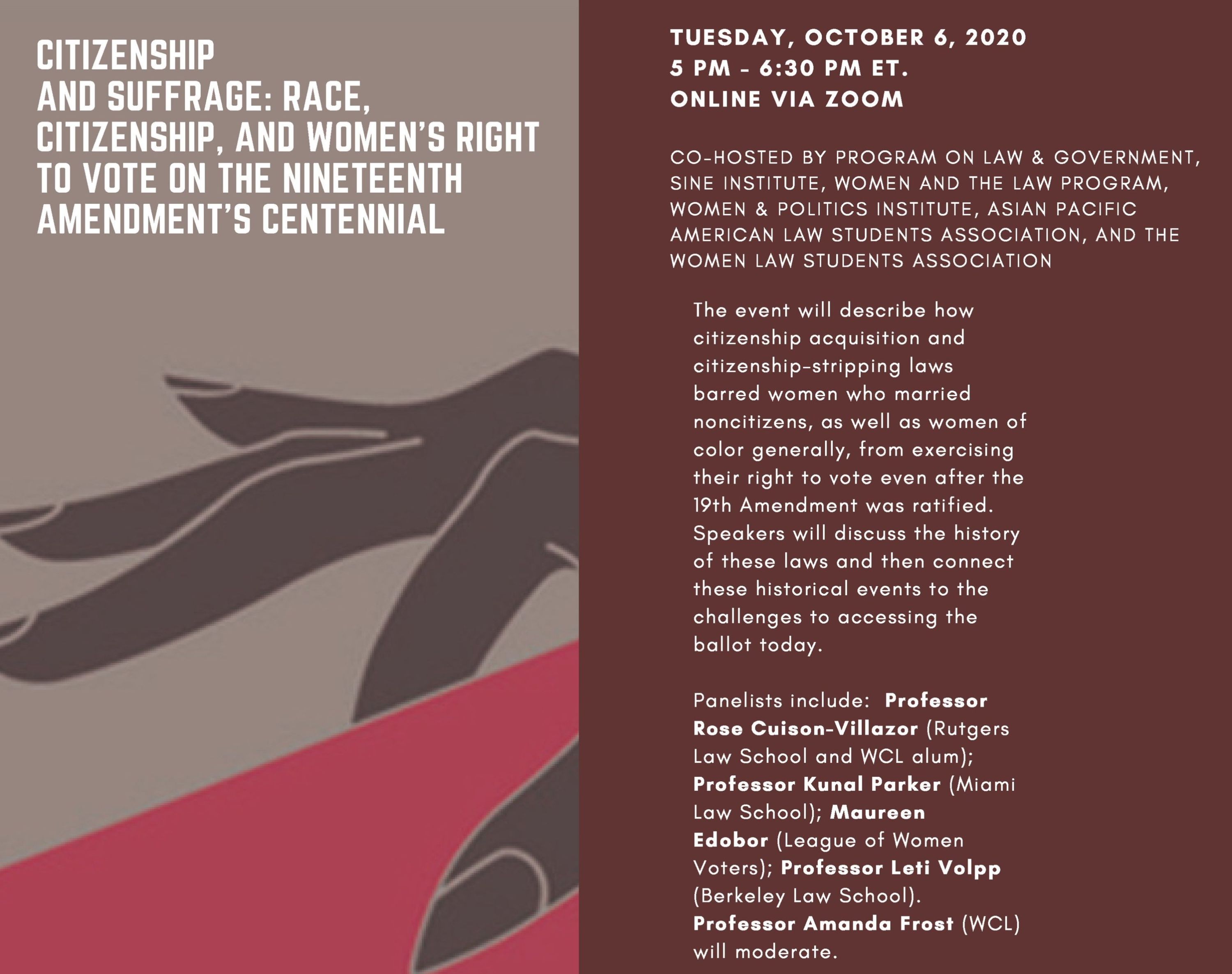Citizenship and Suffrage: Examining the Relationship Between Race, Citizenship, and Women's Right to Vote

On October 6, 2020, American University Washington College of Law (AUWCL) hosted a panel titled "Citizenship and Suffrage: Examining the Relationship Between Race, Citizenship, and Women's Right to Vote on the Nineteenth Amendment's Centennial." The panel was moderated by AUWCL Professor Amanda Frost and featured leading scholars on immigration and election law topics.
The panelists discussed several important issues that face the county one hundred years after the passage of the Nineteenth Amendment. The panelists noted that while the Amendment bestowed upon every woman who was an American citizen a legal right to vote, the reality was that the country fell short of that promise for decades. Against that backdrop, the panelists applied historical information to modern America and the 2020 presidential election to provide attendees with a picture of how gender, race, and politics are interacting in society today.
Professor Frost opened the panel by introducing the panelists. Professor Kunal Parker is a professor and historian at the University of Miami, where he writes about immigration and citizenship through a historical lens. Professor Leti Volpp — a former AUWCL professor — is the Director of the Center on Race and Gender at the University of California-Berkeley and is a professor teaching about citizenship and immigration law at Berkeley. Rose Cuison-Villazor — an AUWCL alumna — is the Director of the Center of Immigration, Law, Policy, and Social Justice at Rutgers University. Finally, Maureen Edobor is an attorney with the League of Women voters' advocacy and litigation team, specializing in election law litigation. Each panelist brought unique expertise and perspective to the discussion.
Professor Parker began the substantive portion of the discussion by providing a historical overview of the shifting ways than the meanings of the terms "citizenship" and "representation" have changed throughout America's complex history. "As I, and many others on this panel have long argued, we must [address] the different senses of citizenship. On the one hand: the legal distinction between citizen and alien. On the other hand, the various gradations of rights and privileges that mark the journey from lesser to greater substantive citizenship are separate from each other. The history of women in the United States is a wonderful illustration of this basic idea." While white women gained the right to vote after the Nineteenth Amendment was passed, they still lacked many rights that men enjoyed. This created a feeling among activists that though women could vote, they were not yet full citizens. Furthermore, non-white women still were effectively disenfranchised, just like non-white men. Thus, by necessity, the struggle for equality and citizenship inherently linked the two concepts of alienism and less-than-full citizenship.
Next, Professor Volpp explained the legal background that existed at the time the Nineteenth Amendment was adopted. In 1920, there were racially based restrictions on both birthright citizenship and naturalization processes. Furthermore, gender and citizenship were connected to these racial restrictions through marriage, as women's legal rights could be affected by virtue of their marriage to a noncitizen. Professor Volpp also noted that reminders of this dark history have recently emerged during the 2020 electoral cycle, including an op-ed that was published in the Washington Post arguing that Democratic Vice-Presidential Candidate Kamala Harris might not be a citizen because her parents were temporary visit on student visas in the United States at the time she was born.
After Professor Volpp, Professor Cuison-Villazor stepped in to look at the intersectional nature of race and gender regarding voting rights. To do this, she shared the stories of women of many different racial backgrounds. She primarily focused on women who are Asian or Pacific Islanders. She also discussed the role of the "empire" in the history of citizenship in America. Specifically, she walked through the concept of "national status," a status conferring on individuals rights that are less than those of a full citizen. She was granted to individuals living in U.S. territories. Throughout the 1900s, many people in places like Puerto Rico, the U.S. Virgin Islands, and Guam had to change their status from "national status" to "citizen." Even today, in American Samoa, people living in U.S. territory are designated nationals rather than full citizens.
Finally, Ms. Edobar spoke about the work done by the League of Women Voters in modern times to enforce the right to vote for all citizens. She explained the biggest threats to people's right to vote, including voter suppression tactics such as laws requiring people to present documentation of citizenship in order to vote. "These laws are turning away registered voters simply because they don't have the wherewithal, the funds, the time, to stand in line at the social certificate center and pay for a copy of their passport or birth certificate." In this way,t he laws place burdens on voters that make it harder for people to exercise their rights. These burdens are also not randomly distributed, and minority groups and poor people are more likely to be deterred from voting.
After laying out the core issues, the panelists engaged in a lively discussion, pointing to how historical discrimination, modern voter suppression tactics, and individual identity factors such as race, gender, and class, can all interact to deter women from voting. They also answered student questions and urged students to exercise their right to vote.
We are grateful to all our distinguished panelists. We are also thankful to students for participating and providing great questions. The panel was a tremendous success! And remember, please vote this election!